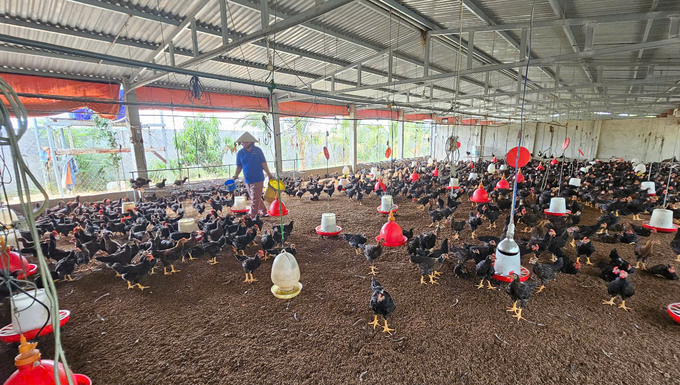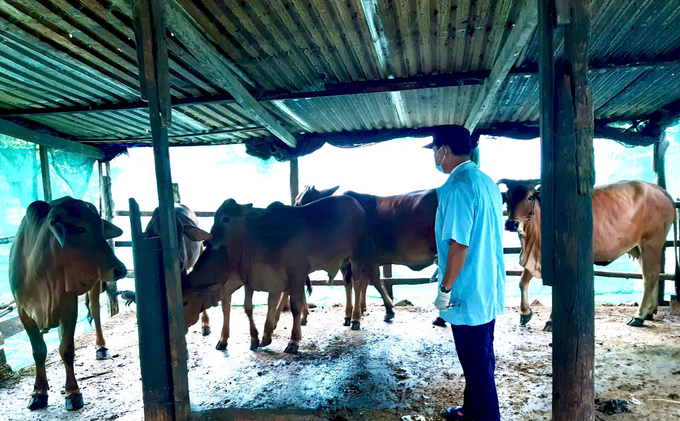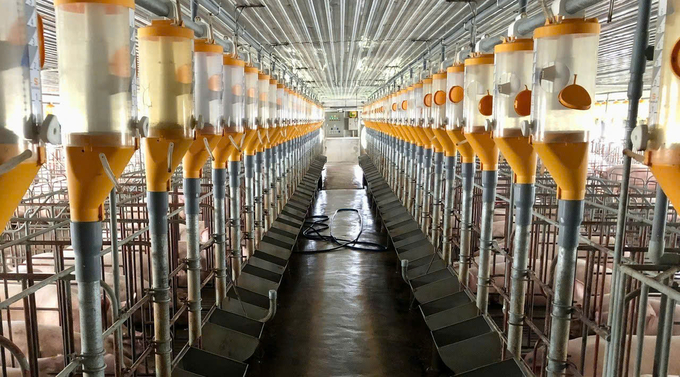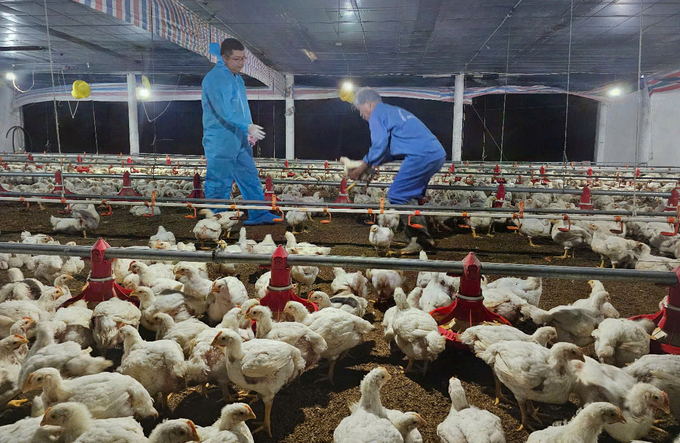June 18, 2025 | 23:40 GMT +7
June 18, 2025 | 23:40 GMT +7
Hotline: 0913.378.918
June 18, 2025 | 23:40 GMT +7
Hotline: 0913.378.918
Similar to other regions nationwide, farmers in Khanh Hoa Province focus on repopulating their herds between January and March every year after selling their livestock during the Lunar New Year holiday. Nguyen Thi Dung, a poultry farmer in Tuan Le hamlet, Van Tho commune, Van Ninh district, is preparing for a repopulation season by cleaning the barns and purchasing additional farming equipment.
According to Dung, her family is relatively experienced in raising free-range meat chickens. During the recent Lunar New Year holiday, Dung sold over 1,000 chickens, earning significant profits after deducting expenses. As preparation for the new farming cycle, they placed an order for 1,000 chicks from a reputable farm in the province. They plan to begin raising a new batch in two weeks.

Farmers are advised to purchase breeding stock with verified origins to promote effective repopulation. Photo: KS.
Similarly, Tran Van Nam, a farmer in Suoi Tan Commune, Cam Lam District, is in the process of purchasing five 3B cattle for stall-fed fattening.
According to Nam, his cattle fattening method involves selecting 10- to 12-month-old calves that weigh between 150 and 200 kilograms each. After rearing the cattle for 3.5 to 4 months, when they reach around 300 kilograms, he sells them for a profit of 3 to 4 million VND per head.
Huynh Kim Khanh, General Director of the Khanh Hoa Province's Sub-Department of Livestock Production and Animal Health, stated that technical agencies have actively instructed farmers on repairing and upgrading barns to meet biosecurity standards with the goal of supporting effective repopulation. Additionally, farmers are advised to carry out thorough cleaning, disinfection, and sterilization of barns and surrounding areas before introducing new livestock.
Local authorities also recommend that farmers purchase healthy breeding stock with verified origins. Notably, a quarantine certificate is required for livestock purchased from outside the province. Before integrating new animals into the herd, a quarantine of at least two weeks is mandatory.
Regular cleaning, disinfection, and sterilization of livestock facilities are essential. Farms should support disinfectant footbaths at entry points, and workers must change into protective clothing before entering livestock areas. Feed must have verified origins, remain within its expiration date, and meet quality and safety standards. Farmers must process repurposed feed with heat treatment before consumption.
During the rearing process, adding probiotics to animal feed can enhance digestion and immunity. Most importantly, farmers must fully vaccinate their livestock against diseases following veterinary guidelines. These include vaccines for foot-and-mouth disease, blue ear disease, salmonellosis, pasteurellosis, classical swine fever, avian influenza, and duck plague. Vaccination is a critical measure in preventing disease outbreaks in both livestock and poultry.

Farmers must prioritize livestock vaccination to ensure disease prevention. Photo: KS.
In addition, livestock farmers must strictly monitor their transportation vehicles, farming equipment, and tools as well as minimize outside access to livestock areas. Notably, they must disinfect transport vehicles both before and after entering barns to prevent the introduction of pathogens.
All equipment and tools brought into farmsites must undergo thorough disinfection or UV sterilization. They can also be placed in a 70°C drying chamber for 30 minutes, followed by a minimum 24-hour quarantine before use. Similarly, medications and vaccines must be dipped in a disinfectant solution and quarantined for 30 minutes before administration.
Farmers are also required to collect waste daily and process it using heat treatment or chemicals. Solid waste must be appropriately treated before disposal to comply with current veterinary hygiene regulations.

Khanh Hoa Province encourages the development of biosecure and disease-free livestock farming. Photo: KS.
According to the Khanh Hoa Province's Sub-Department of Livestock Production and Animal Health, as of the end of January 2025, the province houses a total of approximately 73,000 buffaloes and cattle, 253,688 pigs, and more than 3.1 million poultry. Livestock farming activities in the province are relatively stable, capable of meeting local food demand and supplying other provinces.
Regarding development plans for 2025, General Director Khanh stated that Khanh Hoa Province aims to establish concentrated livestock production areas. As a result, local governments must implement land-use planning for selected regions and encourage the local community to invest in livestock production under Government Decree No. 106/2024 dated August 1, 2024. Accordingly, the decree outlined several policies to enhance livestock farming efficiency. Moreover, the province will continue promoting large-scale farm-based livestock production and utilizing advanced scientific and technological practices to ensure disease control, biosecurity, and environmental protection.
To date, 80% of the province's pig population and 50% of its poultry are raised on farms. The most common models include pig farming in climate-controlled barns with a scale of 1,000 pigs per farm and biosecure poultry farming with 10,000 chickens per farm. These farms primarily operate under contract farming agreements with major businesses such as C.P. Vietnam Livestock Joint Stock Company and CJ Vina Agri Binh Duong Co., Ltd.

A climate-controlled poultry farm in Khanh Hoa Province. Photo: KS.
While a significant portion of livestock farms in the province comply with general animal disease prevention and control regulations, several establishments continue to operate in areas where livestock farming is prohibited.
Regarding this issue, General Director Khanh emphasized that all levels of local People's Committees must compile a list of farms that meet livestock farming requirements, as detailed under Directive No. 1229/UBND-KT, issued by the Khanh Hoa Provincial People's Committee on January 24, 2025. This document pertains to reporting the implementation results of Resolution No. 17/2020/NQ-HDND issued by the Provincial People's Council on December 8, 2020. The approved list must be publicly posted at commune-level People's Committees, and compliance with livestock farming regulations must be closely monitored.
The Khanh Hoa Province's Sub-Department of Livestock Production and Animal Health has requested local farmers to maintain a livestock farming diary and record daily information on disease status, vaccinations, and feed usage. In the event of sudden and unknown livestock or poultry death, or if the animals exhibit symptoms of illness, farmers must promptly report to the local Livestock Production and Animal Health Station and commune-level People's Committee for timely guidance and intervention.
Translated by Nguyen Hai Long
![Turning wind and rain into action: [9] Digitizing hydrometeorological data in response to climate change](https://t.ex-cdn.com/nongnghiepmoitruong.vn/608w/files/news/2025/06/17/z6704423696987_15fd32ffc26d590d204d520c9dac6786-nongnghiep-165943.jpg)
(VAN) Farmers have begun accessing hydrometeorological applications to adjust their cropping schedules, aiming to ensure productivity and adapt to climate change.
![Turning wind and rain into action: [8] Real-time salinity detection and early warning technology](https://t.ex-cdn.com/nongnghiepmoitruong.vn/608w/files/news/2025/06/17/z6704423696987_15fd32ffc26d590d204d520c9dac6786-nongnghiep-151127.jpg)
(VAN) Thanks to the integration of modern hydrological-hydraulic models, remote sensing technologies, and artificial intelligence, the accuracy of hydrological forecasting has significantly improved.
![Turning wind and rain into action: [7] Early disaster warnings help marine farmers minimize losses](https://t.ex-cdn.com/nongnghiepmoitruong.vn/608w/files/news/2025/06/17/z6704423696987_15fd32ffc26d590d204d520c9dac6786-nongnghiep-142942.jpg)
(VAN) In recent years, thanks to early disaster warnings and forecasting, marine farmers in Khanh Hoa province have been able to reduce risks and losses, thereby improving production efficiency.
![Turning wind and rain into action: [6] ‘Four on-the-spot’ disaster management software](https://t.ex-cdn.com/nongnghiepmoitruong.vn/608w/files/news/2025/06/17/e5a48259d6a262fc3bb3-nongnghiep-183800.jpg)
(VAN) By simply activating the scenario on the disaster management software, the relevant authorities immediately know how many households need to be evacuated, where to evacuate them to, and by what means of transportation…
![Turning wind and rain into action: [5] Hue applies modern technology in disaster forecasting](https://t.ex-cdn.com/nongnghiepmoitruong.vn/608w/files/news/2025/06/17/z6704423696987_15fd32ffc26d590d204d520c9dac6786-nongnghiep-093938.jpg)
(VAN) In Hue city, modern technology has recently been applied in meteorological and hydrological forecasting and warning, helping to reduce the damage caused by natural disasters.

(VAN) A cutting-edge farming technique being implemented on an experimental ranch in Arizona's Sonoran Desert has already saved a billion gallons of water over five years, according to Civil Eats.

(VAN) Poultry and pig production and the environment can be boosted through enhanced water technology, according to new research.